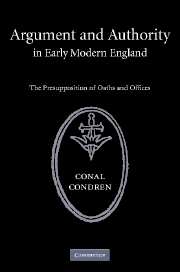Book contents
- Frontmatter
- Contents
- Preface
- Introduction
- Part I The liquid empire of office
- Part II The authority and insolence of office
- 7 The cases of patriot and counsellor
- 8 Casuistry as the mediation of office
- 9 The case of resistance to superior power
- 10 Metaphor and political autonomy
- Part III ‘I, A. B.’
- Epilogue
- Bibliography
- Index
7 - The cases of patriot and counsellor
from Part II - The authority and insolence of office
Published online by Cambridge University Press: 28 October 2009
- Frontmatter
- Contents
- Preface
- Introduction
- Part I The liquid empire of office
- Part II The authority and insolence of office
- 7 The cases of patriot and counsellor
- 8 Casuistry as the mediation of office
- 9 The case of resistance to superior power
- 10 Metaphor and political autonomy
- Part III ‘I, A. B.’
- Epilogue
- Bibliography
- Index
Summary
Who is here so vile, that will not love his country?
But when I tell him he hates flatterers,
He says he does, being then most flattered.
(Shakespeare, Julius Caesar 3.2; 2.1)The interplay between the positive and negative registers of the vocabulary of office was persistent in the disputes concerning the offices of counsellor and patriot. Although plausibly combined, one office was universally accepted and largely institutionalised, the other was not. Discussion of each can help explore the range of contention over the duties of political personae and the dynamics of the resources employed. Brief comment on republican theory in the context of patriotism, and sovereignty theory in that of counsel, will illustrate the importance of not confusing the vocabulary of office with specific theoretical development.
The direction of argument can be indicated by preliminary reference to the words patriot and patriotism. Conventionally they have been studied as markers for a doctrine in relative counterpoint to the ideology of nationalism. In exploring their use as responses to offices asserted or denied, however, it will become apparent that there may be no single doctrinal history to be written. The English ‘patriot’ dates from the early sixteenth century and is closely related to ‘nation’, a term sometimes referring to the people of a given country. Thus the patriot could serve nation, or country.
- Type
- Chapter
- Information
- Argument and Authority in Early Modern EnglandThe Presupposition of Oaths and Offices, pp. 149 - 171Publisher: Cambridge University PressPrint publication year: 2006

